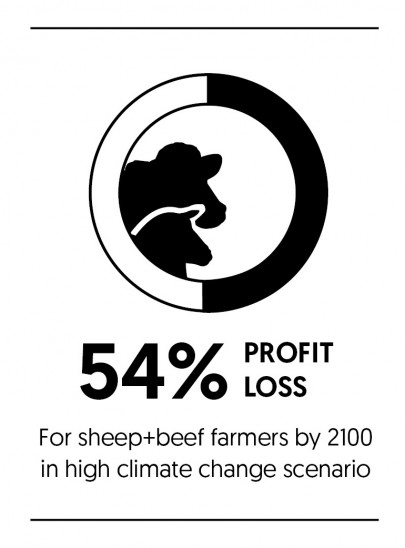 Comparing trends in 70,000 farm tax returns with temperature and soil moisture data, scientists were able to understand the historical relationship between local weather and farm profits in both the dairy and sheep+beef industries, and apply it to future scenarios.
Comparing trends in 70,000 farm tax returns with temperature and soil moisture data, scientists were able to understand the historical relationship between local weather and farm profits in both the dairy and sheep+beef industries, and apply it to future scenarios.
Manaaki Whenua research co-lead Dr Kendon Bell says that uncontrolled climate change is likely to bring somewhat more severe and far more frequent drought.
“Year-on-year drought is still uncommon in New Zealand, giving farmers opportunities to recover – financially, mentally and environmentally, but in the year 2100, our 10-year-old children will be 90 years old. Their children – our grandchildren – will be managing farms in a far more tricky climate than we have to negotiate today.”
Under a high climate change scenario – the pathway representing little climate action and high economic growth – sheep+beef farmers, vulnerable to high temperatures and soil moisture loss, could see a profit loss of up to 54% by the end of the century, subject to a high degree of uncertainty. Analysing potential changes in soil moisture, both dairy and sheep+beef show a decrease in profit by 2100 (an average of 20% for dairy and 7% for sheep+beef). A more moderate climate change scenario suggests – unsurprisingly – more moderate losses given soil moisture changes alone, but losses nonetheless.
Dr Bell notes one use of these results is to better understand how climate change might encourage farmers and growers to implement adaptation measures, or even to change what they farm and where. Due to large capital investments, it’s difficult for farmers to change the way they use their land, and the slow pace of climate change will be unlikely to force land-use change in the near future. Yet this research suggests that land-use change should at least be on the cards in some places.
“Given that animal agriculture is a major contributor to both climate change and water pollution, understanding the extent to which climate change might affect this baseline over time is important for policy considerations over the coming decades, including the setting of future budgets for adaptation support.
“However,” Dr Bell continues, “what’s important is the relative attractiveness of animal versus other land uses. To gain a full understanding of how climate change might affect land-use pressures, we require profit-weather functions for all relevant land uses, in addition to those provided here for dairy and sheep+beef, but the underlying quantitative studies have not yet been done across all sectors.
“In New Zealand, very little research has been done about the implications of climate change for society using approaches that measure the historical relationship between weather conditions and economic and social outcomes – this research is among the first to do so. Rural communities may bear a large share of the burden of reducing emissions, and we have tried to understand, using real financial data, the size of the additional burden that climate change might impose.”